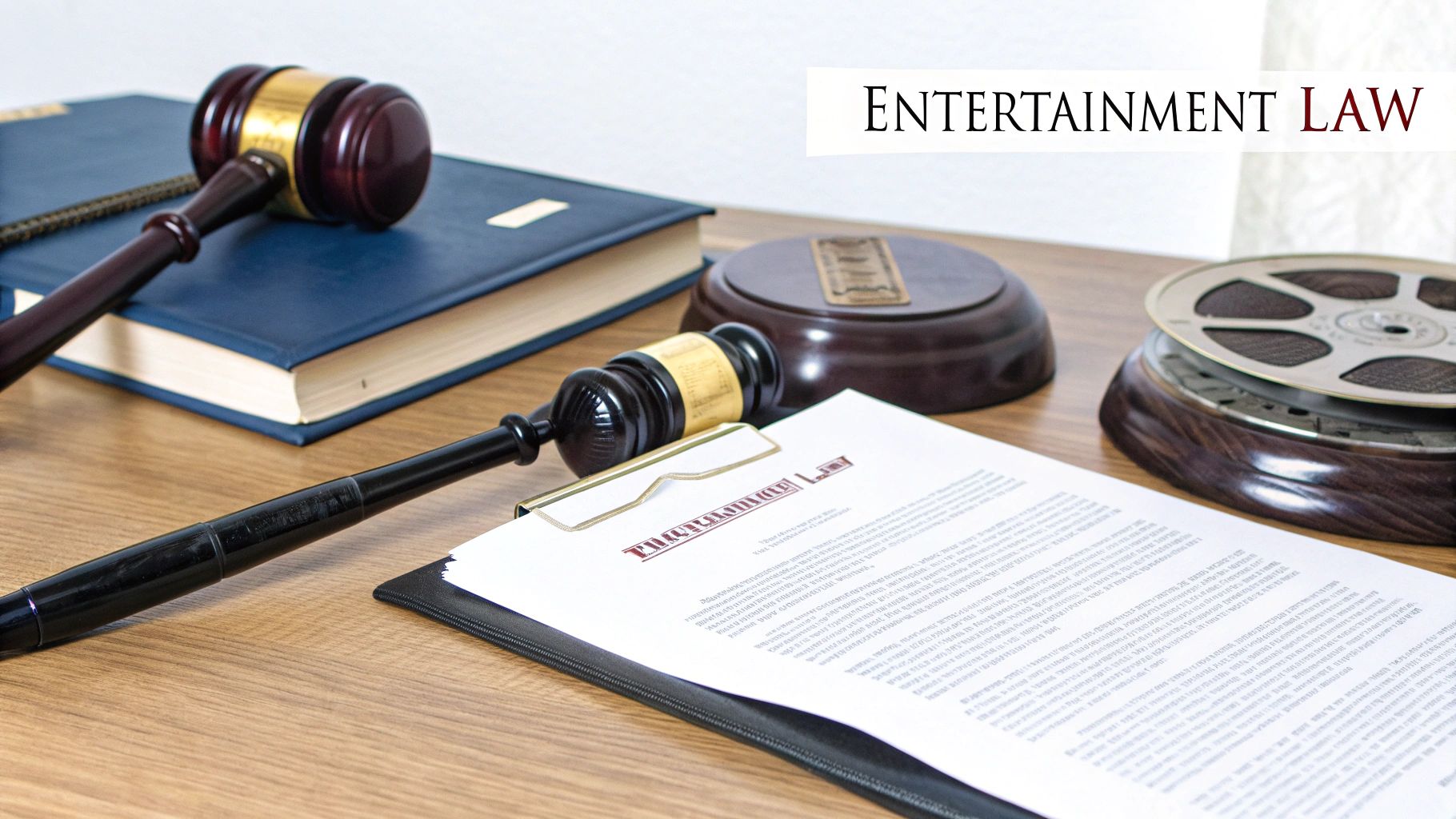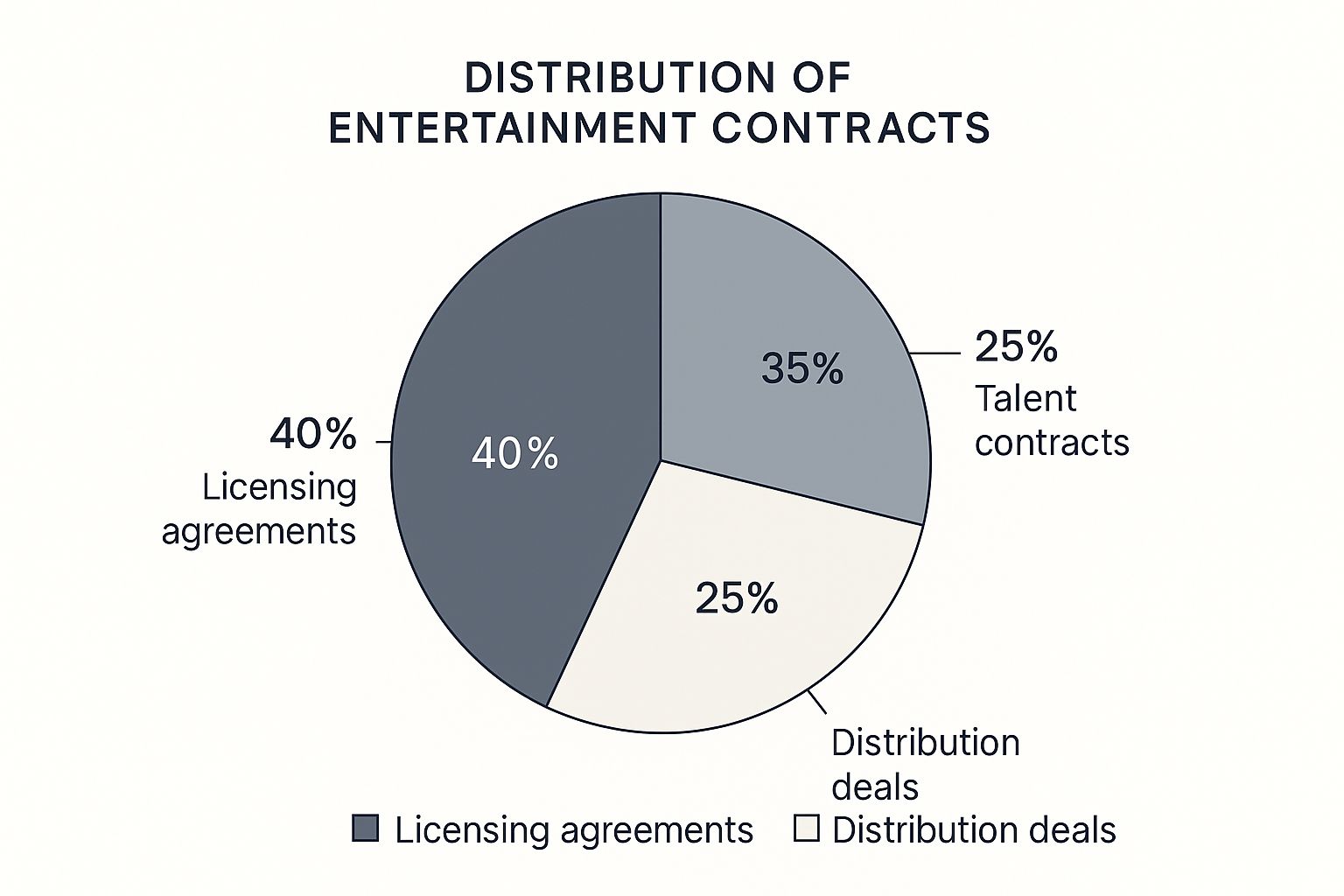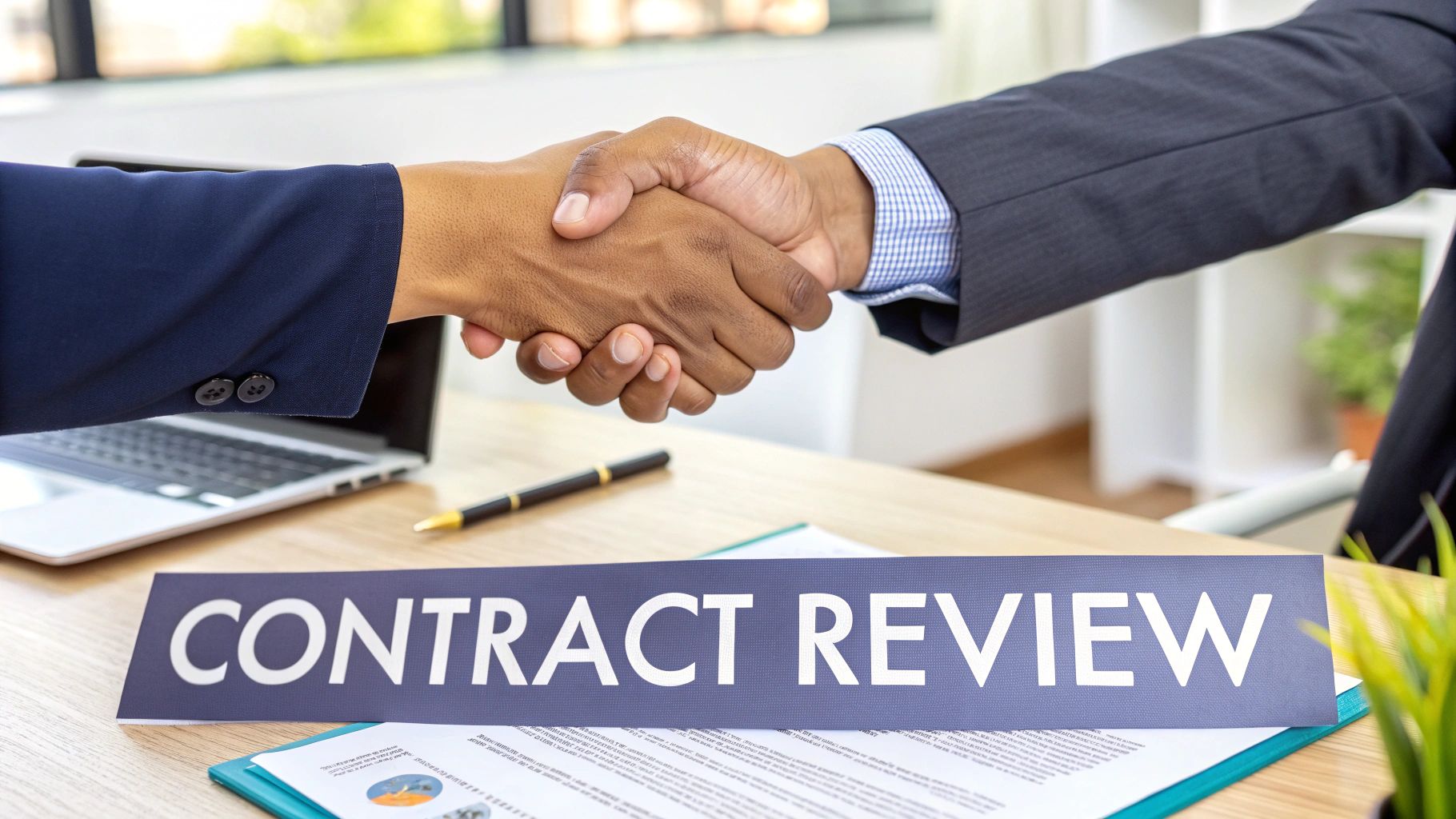The Strategic Role of an Entertainment Law Lawyer
An entertainment law lawyer isn't just a legal representative. They're a strategic partner for creatives navigating the entertainment industry's complex world. Acting as both defenders and advisors, they help clients understand the intricacies of contracts, intellectual property, and the unique legal challenges of this dynamic field. Having an entertainment law lawyer on your team can be the difference between a thriving career and a series of legal headaches.
Why Specialized Legal Counsel Is Essential
General practice attorneys often lack the specialized expertise to handle the nuances of entertainment law. A standard contract lawyer might not grasp the implications of a music licensing agreement or the complexities of film distribution rights. Entertainment law lawyers, however, possess in-depth knowledge of these areas, enabling them to negotiate better deals and protect their clients' interests. For a deeper look at this specialization, check out this article: What is an Entertainment Lawyer?.
The entertainment industry is constantly changing. The rise of streaming services like Netflix and Spotify, the increasing importance of digital rights, and the growing globalization of entertainment create new legal challenges every day. An entertainment law lawyer stays ahead of these changes, ensuring their clients remain protected and well-informed.
This specialized legal knowledge, combined with a keen understanding of industry practices, is critical for success in this competitive field. The growing demand for this expertise is reflected in the global legal services market's growth. As of 2024, this market was estimated at USD 1052.9 billion. It's projected to grow at a CAGR of 4.5% from 2025 to 2030, driven in part by increasing legal complexities in sectors like entertainment. Find more detailed statistics here.

Beyond Contracts: The Advisory Role
Beyond contract negotiation, an entertainment law lawyer also provides vital advisory services. They can help clients with the following:
Protect Intellectual Property: Securing copyrights, trademarks, and patents is essential for any creative professional. An entertainment lawyer guides this process, ensuring these rights are registered and enforced correctly.
Resolve Disputes: Disagreements over contracts, royalties, or ownership are common in the entertainment industry. An entertainment law lawyer provides skilled representation in mediation, arbitration, and litigation.
Navigate Career Decisions: An experienced entertainment law lawyer understands the industry and can advise clients on career choices, partnerships, and long-term strategic planning.
This strategic guidance goes beyond basic legal services, making an entertainment law lawyer an invaluable partner for anyone building a successful creative career.
Navigating Complex Legal Terrain in Creative Industries
The entertainment world presents a unique set of legal hurdles. These intricacies demand specialized legal knowledge, making the role of an entertainment lawyer essential. These professionals grasp the delicate balance between artistic freedom and legal safeguards, ensuring creatives receive proper compensation and that their work is shielded from infringement.
Understanding the Specifics of Entertainment Law
Entertainment law isn't a single, monolithic field. It encompasses various specialized areas, including intellectual property law, contract law, and right of publicity. This breadth means an entertainment lawyer must skillfully navigate a diverse range of legal issues, from copyright infringement to negotiating intricate distribution agreements.
For example, a musician requires an attorney well-versed in music licensing and publishing rights, while a filmmaker needs expertise in film distribution and production agreements. This specialized knowledge distinguishes entertainment lawyers from general practitioners.
The following infographic illustrates the distribution of three main entertainment contract types: Licensing agreements, Distribution deals, and Talent contracts.

As the infographic reveals, licensing agreements constitute the largest segment (40%) of entertainment contracts, followed by distribution deals (35%) and talent contracts (25%). This underscores the importance of licensing and distribution in the entertainment industry and the subsequent need for legal expertise in these areas.
The following table provides a more detailed breakdown of common legal issues across different segments of the entertainment industry. It highlights the specific concerns, risk levels, and typical legal services required for each area.
| Industry Segment | Primary Legal Concerns | Risk Level | Typical Legal Services Required |
|---|---|---|---|
| Film | Copyright infringement, distribution agreements, production contracts | High | Contract negotiation, litigation, rights clearance |
| Music | Music licensing, publishing rights, royalty disputes | Medium | Contract drafting, negotiation, dispute resolution |
| Television | Broadcasting rights, talent agreements, syndication deals | High | Contract review, negotiation, regulatory compliance |
| Digital Media | Content licensing, online piracy, platform agreements | Medium-High | Contract negotiation, intellectual property protection, dispute resolution |
| Video Games | Intellectual property protection, software licensing, development agreements | High | Contract drafting, negotiation, intellectual property registration |
This table demonstrates the wide range of legal challenges present across the entertainment industry. The variations in risk level and required services further emphasize the need for specialized legal counsel.
Why Cookie-Cutter Advice Doesn't Work
Generic legal advice can be detrimental in the entertainment industry. Entertainment law is constantly changing, shaped by new technologies and platforms. What worked for a traditional film studio might not be applicable to a YouTuber negotiating a brand deal.
Entertainment law lawyers anticipate industry-specific pitfalls that general practitioners might overlook. They provide tailored legal strategies that protect their clients' interests while navigating the complex and ever-changing entertainment landscape. This proactive approach not only helps clients avoid potential legal disputes but also sets them up for lasting success in their chosen creative field. Understanding these complexities underscores why seeking counsel from a specialized entertainment lawyer is vital for anyone working in the creative industries.
Finding Your Perfect Entertainment Law Lawyer Match
Connecting with the right entertainment law lawyer can significantly impact your creative career. Choosing a lawyer requires careful consideration. This section offers practical guidance on finding attorneys who truly understand your specific creative field, whether music, film, gaming, or another.
Evaluating Expertise and Connections
When searching for an entertainment law lawyer, evaluate their industry connections as closely as their legal expertise. A lawyer with strong industry ties can open doors to inaccessible opportunities. This access might include introductions to producers, agents, and other key players.
These connections often translate into more favorable deals and smoother navigation of the industry. Consider the lawyer's experience in your specific niche. For instance, a musician in New York City would ideally seek an entertainment lawyer specializing in music law and familiar with the New York music scene. Music Lawyers in NYC. Their specialized knowledge helps them understand the unique legal challenges you face.
Decoding Fee Structures and Recognizing Red Flags
Understanding different fee structures is essential when choosing legal representation. Hourly rates are common, but some lawyers work on a retainer basis, requiring upfront payment. Others might opt for a percentage-based fee, especially in cases with significant potential earnings. Clarify the fee structure upfront to avoid unexpected costs.
Be wary of lawyers who guarantee specific outcomes. The legal landscape is complex. Overpromising or downplaying potential risks is a red flag. Ensure the lawyer communicates clearly and promptly. Unresponsiveness or a lack of transparency can signal problems.
Conducting Revealing Initial Consultations
Initial consultations are crucial for assessing legal knowledge and cultural fit. Prepare questions beforehand, covering experience, connections, and client relationships. Don't hesitate to ask for references. Speaking with other creatives who've worked with the lawyer offers valuable insights.
Use the initial consultation to gauge how well the lawyer understands your creative vision. The best entertainment law lawyers act as both legal representatives and career strategists. They offer guidance based on legal soundness and your aspirations.
Key Selection Criteria
The following table highlights the key selection criteria for choosing an entertainment law lawyer. These factors help you find a legal advocate who champions your creative vision.
| Selection Criteria | Why It Matters | How to Evaluate | Priority Level |
|---|---|---|---|
| Specialized Expertise | Ensures the lawyer understands your field's nuances. | Ask about specific niche experience. | High |
| Industry Connections | Opens doors to valuable opportunities. | Inquire about their network and past deals. | High |
| Clear Communication | Ensures transparency and responsiveness. | Observe their communication style during the consultation. | High |
| Fee Structure | Aligns legal costs with your budget. | Discuss all fee options upfront. | High |
| Personality and Fit | Contributes to a productive working relationship. | Trust your gut feeling during the initial meeting. | Medium |

Finding the right entertainment law lawyer can be a game-changer. By following these guidelines, you can find an attorney who protects your legal interests and helps you achieve your artistic ambitions.
How Technology Is Reshaping Entertainment Legal Practice
The entertainment industry is a fast-paced, ever-evolving world. As technology advances, so too must the legal practices that govern it. The role of an entertainment lawyer is no longer just about understanding contracts and copyright; it's about navigating the complexities of digital platforms, virtual reality, and the evolving economics of streaming.
AI-Powered Contract Review
One of the most significant ways technology is impacting entertainment law is through AI-powered contract review. Traditionally, reviewing contracts was a time-consuming process, requiring lawyers to meticulously pore over every clause. Now, machine learning models can analyze thousands of pages in mere seconds, identifying key provisions and flagging potential issues. This not only accelerates turnaround times but also reduces human error by up to 30% in preliminary due diligence. This allows entertainment lawyers to dedicate more time to strategic negotiations and client counseling.
Blockchain-Enabled Rights Management
Another area of significant change is rights management. Blockchain technology is revolutionizing how ownership is tracked and royalties are distributed. By using smart contracts embedded on distributed ledgers, creators can automate payment triggers when their content is streamed or licensed. This enhanced transparency, with every transaction time-stamped and immutable, minimizes disputes and ensures creators receive their due compensation. Moreover, emerging platforms are enabling fractional rights sales, offering exciting new financing models for independent projects.
Comparing Emerging Tech Tools
The following table provides a concise comparison of the technologies reshaping entertainment legal practice:
| Technology | Key Benefit | Typical Use Case |
|---|---|---|
| AI-Powered Contract Review | Faster clause analysis, risk insights | Drafting and negotiating contracts |
| Blockchain | Immutable records, automated payouts | Royalty tracking, licensing agreements |
| Legal Process Outsourcing | Cost-effective scaling of operations | Document review, e-discovery |
The growth of legal process outsourcing and legal software, projected to reach a market value of $45.4 billion by 2028 with a CAGR of 26.4%, further underscores this trend. Entertainment law firms are leveraging these advancements to streamline operations and provide faster, more efficient services. Find more detailed statistics here
Digital Platforms and Client Dynamics
Client portals and document management systems are also transforming attorney-client interactions. These platforms offer real-time case updates, seamless appointment booking, and secure file sharing, eliminating the need for endless email exchanges. Staying informed about broader technological shifts in areas like taxation can provide valuable context. For instance, this article on the IRS highlights relevant changes: Technology Is Transforming The IRS: Three Big Changes You Need To Know About. Understanding these dynamics is crucial for entertainment lawyers to anticipate both the opportunities and challenges presented by virtual reality, streaming economics, and the evolving landscape of digital rights.
Building a Productive Relationship With Your Legal Advocate
The client-attorney relationship in entertainment law is more than just a simple transaction. It's a dynamic partnership requiring open communication, mutual understanding, and a shared vision for your career. This section explores building and maintaining a successful relationship with your entertainment lawyer.
Initial Consultations and Setting Expectations
The first meeting with a prospective entertainment lawyer is critical. It's your chance to assess not only their legal expertise, but also their communication style and understanding of your creative goals. Come prepared with questions about their experience in your specific field and their client communication approach. For instance, if you are a musician, ask about their familiarity with music licensing agreements and industry connections.
Use the initial consultation to clearly define your expectations. Do you need help with contract negotiation, intellectual property protection, or both? Discuss compensation models, whether hourly rates, retainers, or percentage arrangements, to ensure alignment with your budget. Setting these parameters early builds transparency and trust.
Ongoing Communication and Professional Boundaries
Open communication is vital for a productive attorney-client relationship. This means regular project updates, prompt responses to requests, and clear communication channels for both routine and urgent matters. However, it's equally important to establish healthy professional boundaries.
While your lawyer should be accessible, respect their time and expertise. Avoid unnecessary calls or emails, and trust their judgment on the urgency of issues. You might be interested in: Entertainment Law New York for more insights.
The Evolving Role of Your Legal Advocate
As your career grows, so will your legal needs. An experienced entertainment lawyer becomes a career strategist, advising you on opportunities, helping you avoid costly mistakes, and advocating for your interests at every step. They can assist with:
- Contract Negotiation: Securing favorable terms in agreements for performances, recordings, or licensing deals.
- Dispute Resolution: Representing you in disputes concerning royalties, contracts, or intellectual property rights.
- Career Guidance: Helping you evaluate career choices, partnerships, and strategic planning.
This long-term view emphasizes finding a lawyer who understands not only the legal aspects but also your unique creative vision. Technology plays a key role, and you might find helpful resources on legal workflow automation.
Maintaining a Healthy and Productive Partnership
Building a strong relationship with your entertainment lawyer is an ongoing process. It requires clear communication, mutual respect, and a shared understanding of your career aspirations. By setting clear expectations from the start, maintaining open communication, and recognizing the evolving role of your advocate, you can create a powerful partnership. This involves setting clear goals, regular progress reviews, and promptly addressing any concerns.

Remember, your entertainment lawyer is more than a legal representative; they are a valuable partner invested in your success. A strong, collaborative relationship is essential for achieving your creative goals.
Success Stories: Entertainment Law Lawyers in Action
Real-world results truly demonstrate the impact of a specialized entertainment law lawyer. This section explores anonymized case studies showcasing how these attorneys have protected and advanced creative careers, revealing the tangible benefits of partnering with the right legal advocate.
The Songwriter's Reclamation
One case involved a talented songwriter whose publishing rights were being exploited. Unfamiliar with the complexities of music publishing agreements, they signed a contract granting a large percentage of their royalties to a questionable publisher. This publisher consistently underreported earnings, leaving the songwriter struggling financially despite their music’s success. An entertainment law lawyer specializing in music copyright meticulously reviewed the contract, uncovering hidden clauses and discrepancies in the royalty statements.
After extensive negotiations, the lawyer recovered a significant sum in unpaid royalties and renegotiated the contract to ensure fair compensation going forward.
Navigating International Distribution
Another case involved an independent filmmaker facing challenges with international distribution. Their award-winning film was set for release in multiple countries, but conflicting distribution agreements threatened the project. Their entertainment law lawyer, experienced in international film distribution, resolved the conflicts, clearing the way for a successful international release.
This intervention maintained the film's momentum and secured valuable exposure for the filmmaker, demonstrating how legal intervention can turn difficult situations into successes.
Protecting Emerging Talent
A rising young actress signed a seemingly lucrative endorsement deal. However, the contract contained restrictive clauses limiting her future opportunities. Her entertainment law lawyer, specializing in talent representation, recognized the long-term implications.
Through careful negotiation, the lawyer secured more favorable terms, protecting the actress's future career prospects. This allowed her to pursue opportunities that would have been otherwise unattainable.
Preventative Legal Action
A successful video game developer was approached by a larger company for acquisition. The initial offer undervalued the studio's intellectual property and future earnings. The developer's entertainment law lawyer, experienced in mergers and acquisitions in the gaming industry, reassessed the studio's worth.
They then negotiated a significantly better deal that reflected the studio's true value. This showcases the importance of proactive legal counsel in protecting creative and financial interests.
These case studies showcase the diverse role of an entertainment law lawyer, highlighting both remedial and preventative legal work. These successes underscore the value of having a specialized legal partner dedicated to protecting your creative and financial well-being.
Ready to protect your creative future? Contact Cordero Law today for a consultation. Cordero Law provides expert legal representation for all your entertainment law needs.
